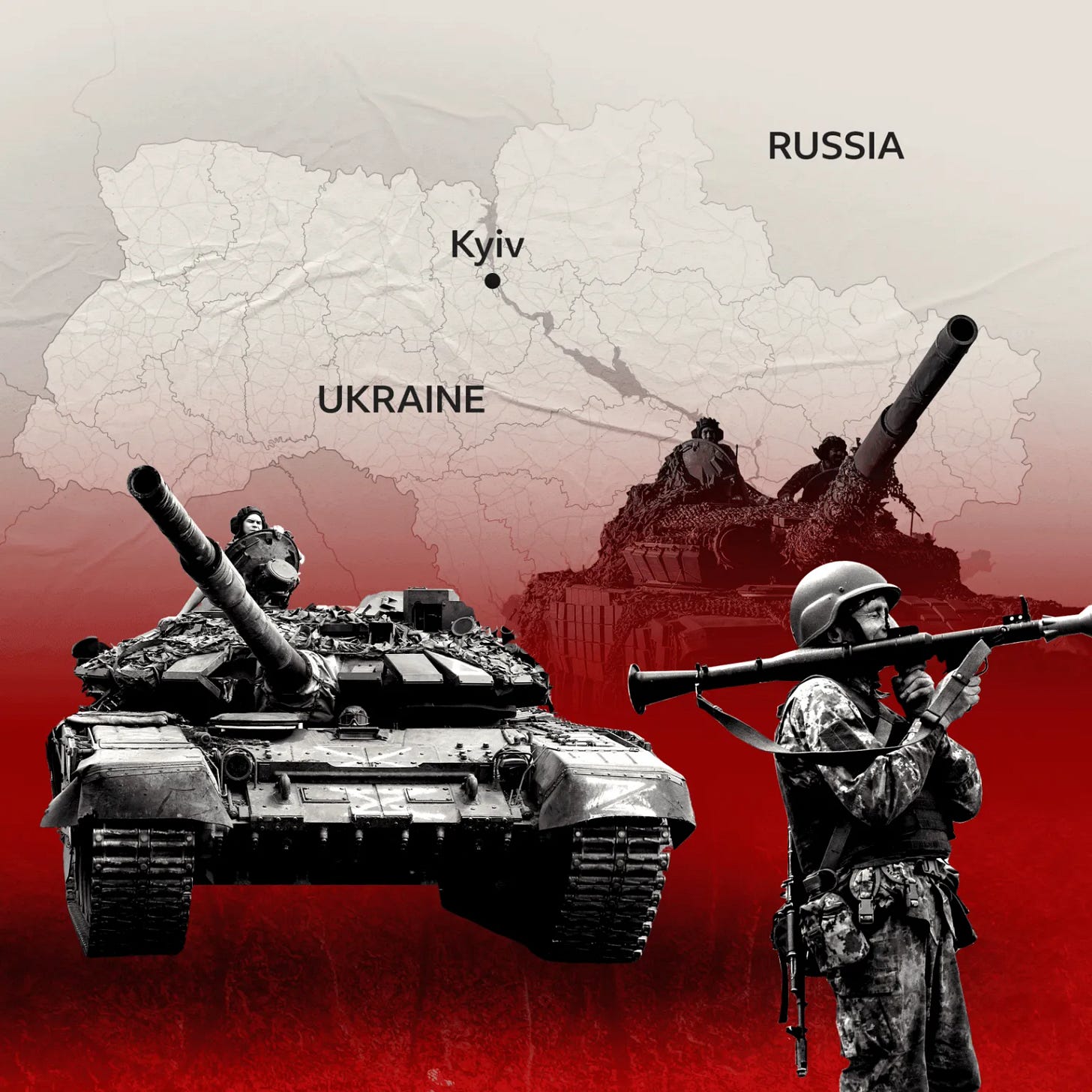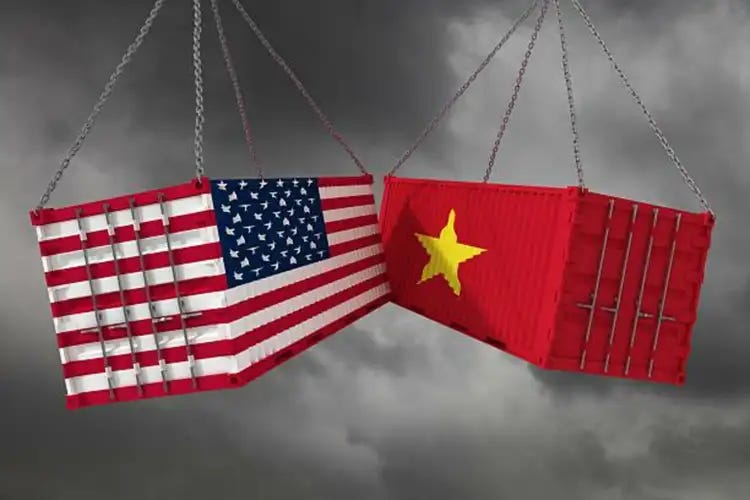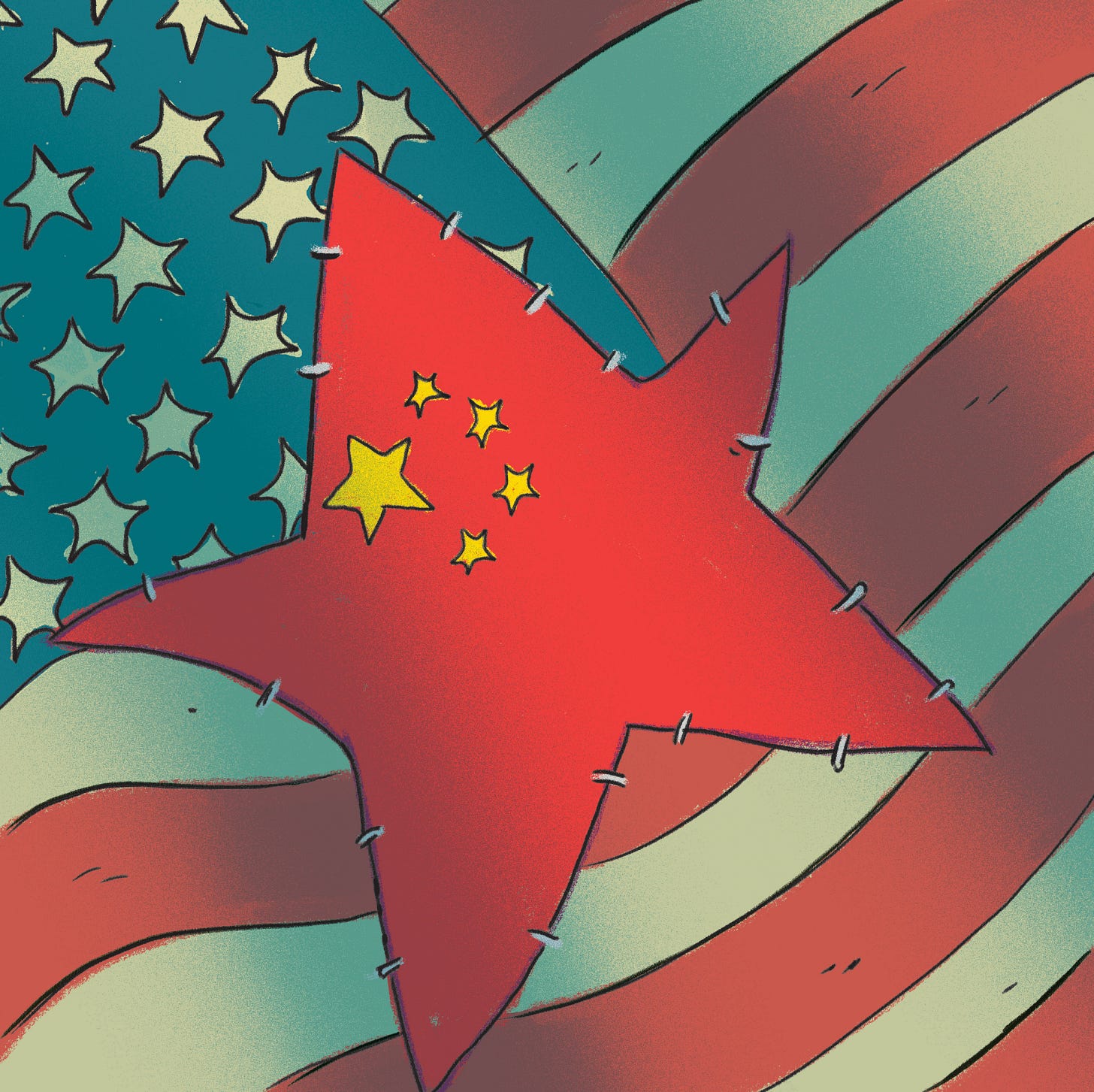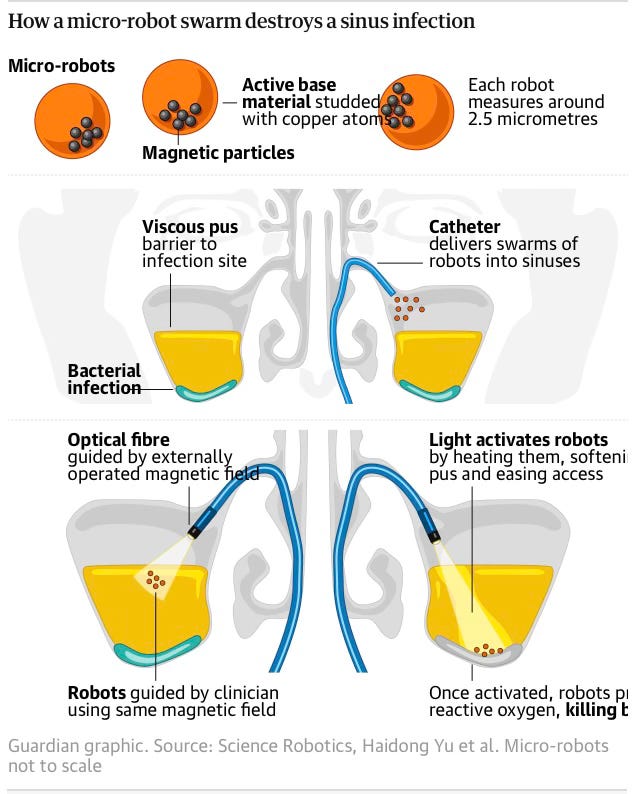This is a reader-supported publication. I give it all away for free but could really use your support if you want me to keep doing this.
1) Starve a cold (war), feed a (war) fever
WAPO: Trump’s weapons freeze on Ukraine could bring devastating consequences
The Trump administration seems to be slipping this one under the radar: no angry tweets, no crazy threats … just quietly cutting Ukraine off on weaponry. As the timing corresponds to Russia’s biggest offensive campaign in a while, it seems particularly callous — almost a green light to Moscow.
Our excuse?
Our ammo stockpiles are running low, and we need them for … you know … the Big One with China, or maybe just for our better friends, the Israelis.
The freeze comes after a Pentagon review determined that U.S. munitions stockpiles were running dangerously low. There were reportedly plans to redirect some of the artillery shells and air defense systems back to the United States or to Israel. The U.S. military is said to have quadrupled its procurement targets for the Patriot interceptors, but the procurement process is lengthy, often taking many years because of the complexity of the systems and intricate supply chains. According to the White House press secretary’s office, the decision “was made to put America’s interests first.” In addition to the freeze, the Trump administration has not proposed to Congress any new military aid package for Ukraine.
America obviously has a number of interests, but this seems petty, given the circumstances, akin to that Seinfeld episode where Jami Gertz’s character can’t spare a square.
The Trump White House is putting pressure on the wrong side in this war, and I find that strategically stupid and morally wrong.
Worse, it does not reflect the will of the American people, whose representatives voted for that funding. The Trump White House is just impounding the money, refusing to spend it — a clear violation of federal law (Impoundment Control Act of 1974).
Per the WAPO Editorial Board:
If Russia prevails in its war of aggression, it will not be because of lack of Ukrainian resolve. It will be because of American fecklessness.
This unfolding situation is entirely shameful on America’s part. It boggles the mind to realize this is what the GOP has become.
2) All the President’s extortion victims
ECONOMIST: Will bowing to Trump win Paramount its merger?
Nice little merger you’ve got going on there. Be a real shame if the government didn’t approve it, wouldn’t it?
So maybe you make nice with the Big Man by slipping him $16M for his “library.” — you know, the one that’s gonna house all his papers from his administration that’s famous for assiduously avoiding putting anything down on paper.
You know, a kleptocracy is just about the lowest form of government there is.
But let us keep pretending that somehow being president is costing Trump income he would otherwise achieve on his own.
Meanwhile, we watch as the bribes roll in.
3) Let’s mak
ECONOMIST: How to strike a trade deal with Donald Trump
No, we’re not getting 90 deals in 90 days. More like a handful and the rest all get threatening letters.
Officials promised “90 deals in 90 days” by July 9th, but progress has been slow. Mr Trump has said that Canada and the European Union have been “very nasty” and Japan “very spoiled”. The aim now is to secure minimal “frameworks” with ten or so countries. It is unclear whether the deadline will hold, and what will happen if it does not. Mr Trump has threatened to send letters declaring talks over and tariffs back on.
Our counterparties are learning:
Britain’s and Vietnam’s deals were narrow, involving only modest concessions—including pledges to curb Chinese influence—in return for targeted relief. Britain won a reprieve on car levies and future taxes on plane parts by granting American beef and ethanol access to its market, and pledging limits on Chinese supply-chain involvement, while leaving thornier matters for another day. Vietnam agreed to open up to SUVs and to accept higher tariffs on Chinese packages stopping off in the country on the way to America. It now faces levies of 20% on most goods, down from the 46% threatened in April.
Others are following a similar script, hoping to swap meagre concessions for exemptions.
We will see a few more such “deals” in the days leading up to the 9 July deadline. As for the benefits, they strike the Economist as self-negating:
It is unclear what America gains from this. Any attempt to bring back industry is undermined by carve-outs. Levies to extract concessions produce only token purchases. Instead of disciplining trade partners, tariffs have created a fragmented system that leaves everyone guessing.
The US Government now operates in the manner of Trump’s private companies. Out with the alliance-building and in with the self-dealing.
4) They long to be close to EU
ECONOMIST: China sweet-talks the EU
The message to Europe from China is simple:
In a world thrown into turmoil by Mr Trump, the EU and China should draw closer together
Recent trade numbers bear that out.
Funny how our ongoing “pivot to Asia” remains mostly about military moves and arms sales while China is pivoting on trade and investment to the EU. Our great answer to China’s rise seems painfully outdated, like we’re still living in the Cold War.
I don’t care which game you want to call it (poker, chess, go), it feels like we’re many moves behind.
I have yet to spot the big American wins in any of this … I mean, other than the Trump family doubling their combined wealth in a matter of months.
5) Golem SMASH! Golem DEVOUR! Golem HUNGRY!
TIMES OF ISRAEL: Likud ministers publish letter calling for Netanyahu to annex the West Bank by end of month
Bit impatient, are we? Is Israel not still busy ingesting Gaza?
But, as we all know with democracies, once the war machine is set in motion, ambitions naturally skyrocket.
Senior Likud lawmakers are pushing for Prime Minister Benjamin Netanyahu to annex the West Bank before the end of the Knesset’s summer session on July 27, claiming that he must ride the “historic achievements” of the war against Iran and do so.
No surprise, per my ongoing analysis.
Likud senses a green light from the Trump administration:
“The strategic partnership, backing and support of the US and President Donald Trump have made it a propitious time to move forward with it now, and ensure Israel’s security for generations,” the ministers argue.
Speed the killing, speed the plow.
6) Totally got that one wrong
WAPO: Pentagon will no longer share satellite data that tracks hurricanes overnight
I, like so many other dreamers, saw the Pentagon taking climate change that much more seriously over time. Trump 2.0 has totally torpedoed that expectation.
From America’s New Map:
A glimpse of this future: America’s National Geospatial-Intelligence Agency (NGA)—a Department of Defense combat support element—increasingly fielding requests from the Federal Emergency Management Agency (FEMA) to divert their powerful satellite-based reconnaissance systems from monitoring, for example, North Korean nuclear sites to locating hurricane victims. That repurposing of defense assets to security purposes will become commonplace as climate change’s system-shaping impact supersedes the dynamics of superpower military rivalries. In the end, defense is necessary but insufficient to winning this global competition for affiliation, the outcome of which will be measured in member states accrued—the geopolitics of belonging.
Not only will the Pentagon not be in that business — one that strikes me as very America-first, but FEMA — as we have long known it — will basically go away, meaning the states will largely be on their own.
That is a serious risk shift on a problem-set that does not respect state borders.
Good luck with that, America!
7) Heat or eat
NYT: How the Hottest Place in India Survives
The short answer: by sweating it out.
India is struggling with heat waves. In some parts of the country, daytime temperatures have hovered close to 50 degrees Celsius, or 122 degrees Fahrenheit.
Three quarters of the country’s population of 1.4 billion is at risk of extreme heat.
That sounds like a billion people to me.
For many Indians, there is no true escape from the heat. Air-conditioning is an impossible dream. Work is done outside, under the sun, and not to work means not to eat.
In the face of those realities, the daily rhythms of life are changing in India, the most populous country on a continent that is warming at a rate twice as fast as the global average.
Heat or eat? That is the question.
India remains the canary in the sauna.
Answers must come if India is going to rise, and that is a dynamic of profound interest for the entire world.
8) It’s beginning to look a lot like China!
NYT: Trump’s America Is Beginning to Look More Like China
As always, we must lament the Great Lie, described here as the “fairy tale of globalization”: China should be a carbon copy of America by now, damn it!
And, if it is not? Then weren’t we all betrayed by the globalists!
It’s a simplistic, reductionist perspective that betrays our self-centeredness: All progress conforms to American forms.
Here, at least, we get the secondary observation, which is accurate enough:
Once upon a time, many Americans believed China would inevitably become more like us just by plugging into the world trading order that we established and maybe, as President Bill Clinton once suggested, even democratize. The final victory of American-led neoliberalism was close at hand.
Mr. Clinton and others like him weren’t entirely wrong. China has spent decades emulating key elements of the American model of entrepreneurialism, consumerism and integration with global markets. It made China an industrial power, with a large middle class, cutting-edge science and technology, and global brands like Huawei, Lenovo and Alibaba. China’s 1.4 billion people live far more diverse and prosperous lifestyles than ever. Through it all, America was the model.
What neither Americans nor Chinese imagined was how much this would become a two-way street.
In the great contest of ideas and influence between the two countries, the pendulum seems as if it’s swinging back the other way. Donald Trump’s return to office has made clear that in important respects — democratic erosion, the fixation on strong borders, the curbing of free speech and numerous other examples — America is starting to look a bit more like China.
So what does that really tell us? It tells us that whenever you perceive yourself as #2, you tend to model yourself on #1 — that’s all.
America right now feels inferior to China, so we ape it.
That’s not some great flaw of globalization. America has long displayed the tendency to mirror-image itself vis-a-vis our preferred threat: we became super conformist as we battled the automaton Soviets, then we shamelessly emulated Japan Inc.’s brutalism, then we re-traditionalized in the face of the radical Salafi threat, and now we’re looking up at China in frightful admiration.
Rising or falling, we are a nation of mimics.
9) The (Russian) Bears still suck!
WAPO: Russia unleashes its summer offensive with an army mired in problems
This is why low-balling the Ukrainians on military aid is so despicable: it just evens the playing field, ensuring more stalemate, more death, more destruction.
The Vietnam War analogies write themselves:
Russian military bloggers and independent media reports on Telegram in recent months have presented a consistent portrait of a problematic military culture, including generals making false claims about conquering villages, troops being sent on “meat assaults” with little regard for their survival, and poor transport and logistics on the front lines resulting in the deaths of wounded soldiers.
Commanders are often described as corrupt — demanding bribes to spare soldiers from deadly assaults and implementing punishment regimes, including caging soldiers or “zeroing” them out, meaning having them killed or sending them on suicidal assaults.
The result, these bloggers say, is low morale, desertions and widespread drunkenness and drug abuse among Russian troops.
So, naturally, this is the time for America to go all wobbly.
You want peace? Then show some strength here, Mr. Trump.
10) Tech Bro cosplay
MILITARY.COM: Tech Executives Commissioned as Senior Army Officers Won't Recuse Themselves from DoD Business Dealings
I have no idea why putting Silicon Valley tech execs in uniform is required.
The US military has pursued and processed tech revolution after tech revolution, triggering most of them on their own, but now we need to start with the Tech Bros going to fantasy boot camp?
Oh, and then their self-dealing will seem less egregious? Or somehow send the “right signal” to the troops?
This drill just strikes me as complete and utter bullshit.
Now the Tech Bros can win medals and contracts at the same time!
Again with the kleptocracy!
11) The Canadians catch on
EURASIAN TIMES: Canadian govt orders Chinese firm Hikvision to cease operations over national security concerns
All those Chinese cameras being mounted in cities across the world begs the question, Who watches the watchers?
Well, Canada has seen the light — that red one on top of the camera that says it’s on.
Now, the question becomes, Whose cameras are going to be used instead? The West needs to fill this gap in its vision of future security because that future is coming fast for all of us.
12) Say hello to my little friends
GUARDIAN: Swarms of tiny nose robots could clear infected sinuses, researchers say
As someone who’s suffered dozens upon dozens of sinus infections, you have my complete attention.
Swarms of tiny robots, each no larger than a speck of dust, could be deployed to cure stubborn infected sinuses before being blown out through the nose into a tissue, researchers have claimed.
The micro-robots are a fraction of the width of a human hair and have been inserted successfully into animal sinuses in pre-clinical trials by researchers at universities in China and Hong Kong.
Swarms are injected into the sinus cavity via a duct threaded through the nostril and guided to their target by electromagnetism, where they can be made to heat up and catalyse chemical reactions to wipe out bacterial infections. There are hopes the precisely targeted technology could eventually reduce reliance on antibiotics and other generalised medicines.
As someone whose had a lot of nasty things shoved deep into my sinuses, let me just say I’m eager to sign up as the one-billionth test subject — you know, after all the class-action lawsuits have been settled.
Still, you just know this is coming to a nostril near you.



















